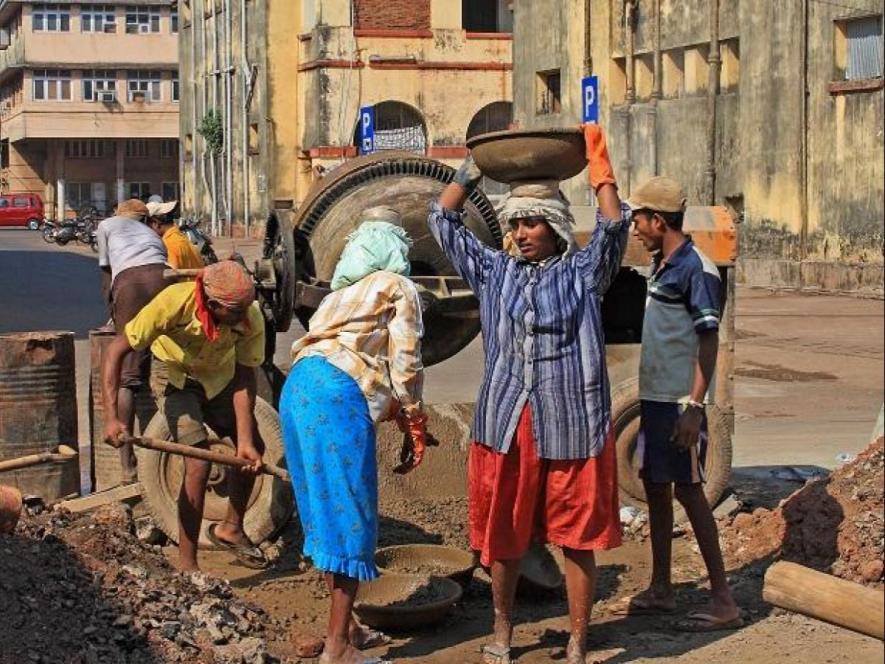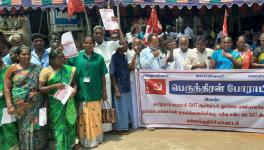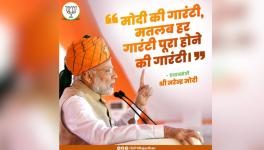Code on Wages Act and Scope of the City to Intervene

Representational image. | Image Courtesy: Business Standard
This article may sound very utopian, but it has an element of optimism in it. In the wake of the recent adoption of the Code on Wages Act (CWA) 2019, by Parliament, to think and to identify a window or space for the workers’ rights in the cities, within the city government’s framework, is rather too ambitious. But, here’ s an attempt to develop it, in this article. But, before we go into the details of the city’s charter or the ‘Seoul Declaration on Decent Work City’, let us take stock of the prevailing situation of the working people in the cities in the background of the adoption of the CWA.
One of the obvious reasons to have a law that defend the interests of the working people is that post 1990s, the informal sector has grown is metes and bounds. Now, in India, 93% of the workers are employed in the unorganised sector. Amongst the remaining 7%, a large majority do not have either job security or proper wages. Casualisation and contractorisation has severely affected the bargaining capacity of the working class.
Another startling truth pertains to the fact that 82% of the workers have no written contract with the employer. A startling 77.3% of the workers have complained about the wages and holidays; 69% have no access to social security benefits of the state. There is another form of informalisation that is taking credence in the cities. And this is the growth of app-based or platform-based workers. For example, Ola and Uber drivers, food service industry workers working under various brands like Zomato, Swiggy, etc., have hardly any security either in terms of wages or work. Social security does not even reach them.
During the past three decades, there has been a massive increase in the total wealth that is being generated in the country. The cities contribute to roughly 70% of it. However, distribution of this wealth in the form of various social securities has weakened. According to the Azim Premji University’s Centre for Sustainable Development report, among the regular wage earners, more than 57% have been earning less than Rs 10,000 per month. Around 59.3% causal workers are getting wages less than Rs 5,000. If another 25% of wage bracket of Rs 5,001-7,500 is added, around 84.3% casual workers are getting less than Rs 7,500 in wages.
Similarly, formal housing has also decreased over a period of time. Formal housing implies housing where either the state or public spending is used to construct houses for the working people. It has fallen from over 6% to near 3%. According to Professor Ravi Srivastava, from the Institute of Human Development, for any developing nation, the bare minimum of 25% of housing must be provided in the formal sector and the private or informal housing market can cater to the 75%. However, in the Indian scenario, the condition is extremely precarious, especially after the implementation of the neoliberal policies, post 1990s.
The latest addition to the plethora of attacks, is, in the form of amalgamation of four different acts of the past into the Code on Wages Act 2019. This metamorphosis is of the Payment of Wage Act, 1936, the Minimum Wages Act, 1948, the Payment of Bonus Act, 1965 and the Equal Remuneration Act, 1976. The central government terms it a historic decision, where the law is made easy to interpret. However, the working-class unions have vehemently opposed it. The Rajya Sabha, while discussing the Code on Wages Bill, saw an utterly ridiculous debate. Except Madhusudan Mistry of Congress and Elamaram Kareem of the Communist Party of India [CPI(M)], none had come prepared for the debate. Despite the fact that more than 50% of the population is going to be affected with the new law, 90% of the members in the Rajya Sabha were not present. The bill was passed by a massive majority with 85 voting in favour and only eight voting against.
The provisions of the bill are indeed draconian. The provision of advance payment, which was considered to be a step towards bondage of the workmen, is allowed in the new act. The previous law, which held a criminal obligation on the employer to pay the wages, is, in the new act, replaced into a civil wrong. Above all, the method to calculate the wages is seriously flawed. The Supreme Court directions to calculate the minimum wages took into consideration per capita food intake of at least 2,700 calories for a worker’s family comprising three units; per capita cloth of at least 18 yards per annum; provision of housing as per minimum rent charged by the government industrial housing scheme for low-income category, etc. The CWA 2019 leaves fixation of minimum wage to the discretion of the government – both central and state. The other major casualty of the CWA is the ‘eight hours working day’.
Also read: Regularisation of Unauthorised Colonies is Good, But What About Slums
OPTIMISM OF SEOUL DECLARATION
While the implementation of the Code on Wages Act will witness erosion of the rights of the workmen, a Seoul charter prepared by the city government of Seoul is another eye opener. This declaration, on “Decent Work City”, speaks about the role of the city government in ensuring decent work to the workmen engaged in different kinds of work within the city limits. The declaration, once adopted shall become a document to guide the city government and employers to ensure that decent work is provided. By decent work, the preamble quotes from the ILO policies, “The organisation proposed quality and quantity boost of employment, guarantee of rights to work, social protection, and social dialogue as the strategic pillars of the ‘Decent Work Agenda’, and has been thus far cooperating with its tripartite constituents around the world to realize the agenda.”
The Seoul Declaration, once accepted by the city government, the following provisions will be implemented: -
- Agree with the ILO’s strategy for creating Decent Work, and strive to practice them at the city level. Cities’ tripartite constituents will join forces with international organisations and the central government to devise a Decent Work strategy at the city level, and to that end strengthen the international cooperation among cities.
- Strive to create quality jobs at the city level. Ways to stabilise employment, including creation of decent jobs and the regularisation of irregular workers, will be promoted. Also, easy access to jobs will be actively pursued, and efforts to provide sufficient education and training opportunities for workers, today and tomorrow will be carried out.
- Recognise the importance of ILO’s Fundamental Conventions, which include the basis of Decent Work, namely the freedom of association and the right to collective bargaining, and we endeavour to provide appropriate social protection at the city level. Also aim to ensure opportunities that guarantee adequate wages such as the living wage for low-income workers, and strive to build effective social safety nets for workers both within and outside the labour market.
- Based on the cooperation of the central government, Decent Work policies at the city level should be collectively made by all actors such as the city government, trade unions, employers’ organisations, and civil society. In this regard, we shall strengthen social dialogue and cooperation with all stakeholders at the city level.
- Pursue a “Decent Work City Network” to share and spread “Decent Work City” strategies. We will establish a collaborative body of Decent Work Cities to share policies of one another, and spread results thereof.
- Shall actively address challenges arising from a full-scale reformation of the future of work propelled by economic digitization. Proactively respond to various changes in employment arrangements that will spread in the future, while at the same time strive to build a “City with Respect for Labour.”
LIMITATION AND SCOPE OF DECENT WORK CITY NETWORK
While it sounds quite radical that the city government will play a proactive role to provide decent work for the workmen, there is scepticism that under the shadow of federal laws, the city government will hardly have any scope to intervene. Though, there are evidences of some proactive legislation in the interests of the unorganised working class in Kerala and Maharashtra. Kerala has announced a minimum wage of Rs 18,000 per month and in Maharashtra, there are laws for the head load workers and other informal sector workers in the state. But these laws are legislated by the state governments, which have the power and ability to enact them. However, the city governments hardly have any power in India to make such interventions.
But this does not completely overrule or leave the scope for intervention in the cities. The provision for decent work in the city can be embedded in the smart city’s and AMRUT plans. These plans are about infrastructure and area-based development in the cities. The city governments, if they adopt the Seoul Declaration, can embed the provisions of the Decent Work in the Smart city and AMRUT plans, where infrastructure development is taking place. Another scope happens to be the standing committees of the city governments working under the elected councils. These standing committees – especially those related to imparting social justice – has a key role to guide and provide such a direction. I remember, while being the deputy mayor of Shimla and ex-officio chairperson of the standing committee on social justice for the city, such cases were promoted to be brought to the notice of the social justice committee and later settled. These committees, which are rather redundant in the cities must be made functional. Once adoption of the Seoul Declaration by the city is done, such a paradigm shift in the policy can be adopted in the city’s charter. But to put this into practice, the city governments will have to create a policy framework. Which is difficult, but definitely not impossible!
Also read: Budget 2019-20 Belies Hopes of Urban People
Get the latest reports & analysis with people's perspective on Protests, movements & deep analytical videos, discussions of the current affairs in your Telegram app. Subscribe to NewsClick's Telegram channel & get Real-Time updates on stories, as they get published on our website.
























